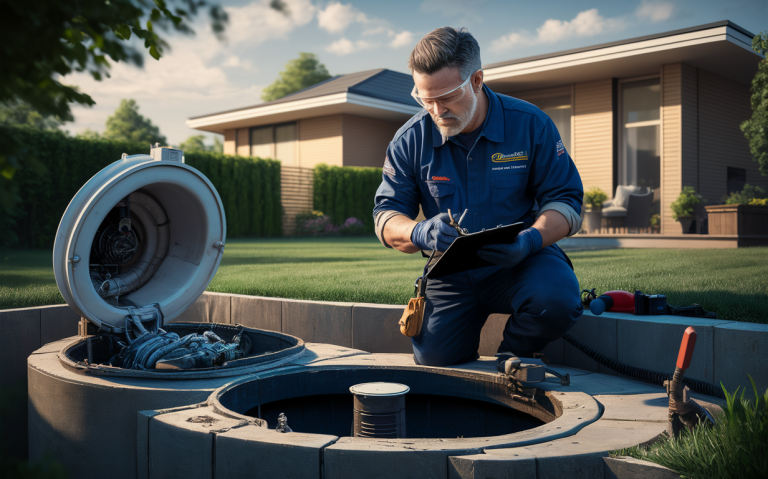Affordable Septic System Maintenance Plans for Success
Key Takeaways:
- Regular preventive maintenance extends the life of your septic system
- Scheduled inspections and pumping help avoid costly emergency repairs
- A well-designed plan includes routine tasks, schedules, and record-keeping
- Professional septic services can create and implement customized maintenance plans
- Proper care and maintenance protect both your property and the environment
Understanding the Importance of Septic System Care
Septic systems play a vital role in managing wastewater for homes and businesses not connected to municipal sewer lines. These underground systems require regular care to function properly and avoid costly breakdowns. An affordable septic system maintenance plan is essential for keeping your system running smoothly and preventing unexpected issues.
What is a Preventive Maintenance Plan for Septic Systems?
A septic cleaning and maintenance plan is a structured approach to caring for your wastewater treatment system. It includes scheduled inspections, pumping, and other routine tasks designed to catch potential problems early and keep the system operating at peak efficiency.
Key Components of a Septic System Maintenance Plan
Regular Inspections
Professional inspections are the foundation of any good septic maintenance plan. During these checks, a technician examines the tank, pipes, and drain field for signs of wear or damage.
Scheduled Pumping
Removing accumulated solids from the septic tank is crucial. The frequency of pumping depends on factors like household size and water usage. Our affordable septic system maintenance plans ensure pumping is done on schedule to maintain system health.
Water Conservation Practices
Reducing water use helps prevent system overload. This includes fixing leaks and using water-efficient appliances.
Proper Waste Disposal
Educating household members about what should and shouldn’t go down the drain is important to septic care.
Record Keeping
Maintaining detailed inspections, pumping, and repair records helps track the system’s health over time.
Creating Your Septic System Maintenance Schedule
Assess Your System’s Needs
Consider factors like the age of your system, household size, and local regulations when planning maintenance.
Set Inspection Intervals
Most experts recommend annual inspections for residential septic systems as part of an affordable septic system maintenance plan.
Determine Pumping Frequency
On average, septic tanks need pumping every 3-5 years, but this can vary based on usage and tank size.
Plan for Seasonal Care
Some maintenance tasks, like checking for frost damage, are seasonal.
Professional vs. DIY Maintenance
Tasks for Professionals
Certain maintenance tasks, like tank pumping and system inspections, should always be done by certified professionals.
Homeowner Responsibilities
Daily care, like practicing water conservation and proper waste disposal, falls to the homeowner.
Implementing Your Preventive Maintenance Plan
Start with a Baseline Inspection
If you’re unsure of your system’s current condition, begin with a thorough professional inspection.
Create a Maintenance Calendar
Use a digital or physical calendar to track scheduled maintenance tasks.
Set Reminders
Use smartphone apps or other tools to remind you of upcoming maintenance dates.
Educate Household Members
Make sure everyone in your home understands their role in septic system care.
The Cost of Preventive Maintenance vs. Repairs
Long-term Savings
Regular maintenance is far less expensive than emergency repairs or system replacement.
Protecting Property Value
A well-maintained septic system can increase your property’s value.
Avoiding Environmental Hazards
Proper maintenance prevents groundwater contamination and other environmental issues.
Common Septic System Problems Prevented by Maintenance
Drain Field Failure
Regular pumping and inspections can prevent costly drain field issues.
Tank Overflow
Scheduled pumping helps avoid tank overflow and backups.
Pipe Blockages
Routine cleaning can prevent stubborn clogs in septic pipes.
Adapting Your Plan Over Time
Responding to System Changes
As your system ages or household needs change, your maintenance plan may need adjusting.
Incorporating New Technologies
Stay informed about new septic care technologies that could improve your maintenance routine.
Working with Septic Service Professionals
Choosing a Reliable Provider
Look for licensed, experienced professionals with good local reputations.
Building a Long-term Relationship
Working with the same service provider over time can lead to better, more personalized care for your system.
Environmental Benefits of Proper Septic Maintenance
Protecting Groundwater
Well-maintained septic systems help safeguard local water sources.
Reducing Pollution
Proper care prevents harmful bacteria and nutrients from entering the environment.
Septic System Maintenance in Different Climates
Cold Weather Considerations
In colder regions, protecting against freezing is an important part of maintenance.
Hot and Humid Climate Care
Warmer climates may require more frequent pumping due to increased bacterial activity.
Technology and Septic System Maintenance
Smart Monitoring Systems
New technologies can provide real-time data on your septic system’s performance.
Digital Record Keeping
Software and apps can help you track maintenance history and schedule future care.
Legal and Regulatory Aspects of Septic Maintenance
Local Regulations
Many areas have specific requirements for septic system care and inspection frequency.
Documentation for Property Transfers
Proper maintenance records can be valuable when selling a property with a septic system.
Septic System Maintenance for Different Property Types
Residential Systems
Home septic systems typically require simpler maintenance plans.
Commercial Property Considerations
Businesses may need more complex maintenance schedules due to higher usage.
Troubleshooting Common Maintenance Issues
Identifying Warning Signs
Learn to recognize early indicators of septic system problems.
When to Call a Professional
Know which issues require immediate professional attention.
The Role of Landscaping in Septic System Care
Proper Planting Near Septic Systems
Certain plants can help absorb excess moisture without damaging the system.
Avoiding Harmful Landscaping Practices
Some landscaping activities can damage septic components if not done carefully.
Septic System Maintenance Education
Community Outreach Programs
Many areas offer educational resources on septic care for homeowners.
Online Resources
Utilize reputable online sources for up-to-date information on septic maintenance.
Seasonal Septic System Maintenance Tasks
| Season | Maintenance Tasks |
|---|---|
| Spring | Monitor water usage, and check for odors or slow drains |
| Summer | Monitor water usage, check for odors or slow drains |
| Fall | Prepare system for winter, clear leaves from septic area |
| Winter | Avoid compacting snow over system, maintain regular use |
Septic System Components and Their Maintenance Needs
| Component | Maintenance Task | Frequency |
|---|---|---|
| Tank | Pumping | 3-5 years |
| Pipes | Inspection | Annually |
| Drain Field | Check for saturation | Bi-annually |
| Filters | Cleaning | Annually |
| Pumps | Testing | Annually |
Tips for Extending Your Septic System’s Lifespan
- Use water efficiently to reduce strain on the system
- Avoid flushing non-biodegradable items
- Keep heavy vehicles away from the drain field
- Plant only grass over and near the septic system
- Direct roof drains and other rainwater runoff away from the drain field
The Value of Consistent Septic Care
A well-planned and executed affordable septic system maintenance plan is key to the longevity and efficiency of your septic system. By following a regular schedule of inspections, pumping, and care, you can avoid costly repairs, protect the environment, and ensure your system functions properly for years to come.
Remember, a small investment in routine maintenance can save you significant money and stress in the long run. If you’re unsure about creating or implementing a maintenance plan for your septic system, don’t hesitate to consult with a professional septic service provider who can offer expert guidance tailored to your specific needs.
For more information, you can visit our website or contact us.







 Texway Wastewater Services is a septic, wastewater, and excavation company based out of Burleson, Texas and serving the surrounding areas. We specialize in
Texway Wastewater Services is a septic, wastewater, and excavation company based out of Burleson, Texas and serving the surrounding areas. We specialize in